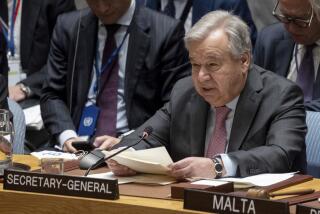U.N. Tells Iraq to Cooperate or Be Punished
- Share via
UNITED NATIONS — The Security Council warned Iraq on Saturday that it faces further sanctions for barring U.N. arms inspectors from sensitive sites by adopting a resolution worked out by President Clinton and Russian President Boris N. Yeltsin.
The vote was a unanimous 15-0 with even China supporting the resolution after hours of consultations.
Although the agreement was weaker than the United States and Britain first proposed, both nations were satisfied that the council took a tougher position than it has over the last year.
“There is less poison than there was before, but it is still poisonous,” said Iraq’s ambassador, Nizar Hamdoun, before the vote was taken. “That’s my way of describing the text.”
Specifically, the resolution:
* Expresses the council’s “firm intention to impose additional measures” on Iraqi officials responsible for barring the U.N. arms inspectors from sensitive sites. But new sanctions would need another council resolution.
* Suspends regular reviews, usually held every 60 days, until Oct. 30 on the current stringent trade sanctions imposed on Iraq.
* Demands unconditional access for U.N. arms inspectors to all areas, facilities, equipment and records as well as to officials and others they want to interview.
The U.N. inspectors, looking for weapons of mass destruction and related materials and documents, were prevented from searching three sites earlier this month. Iraq argued it has the right to bar them from sites dealing with national security.
Unless the inspectors are satisfied, stringent sanctions against Iraq, particularly a ban on oil exports, cannot be lifted. The embargoes were imposed in 1990 after Baghdad invaded Kuwait.
A senior U.S. official, speaking on condition of anonymity, said that a deal was struck on the resolution between Clinton and Yeltsin, who are attending a summit of the world’s leading industrialized nations in Denver.
The U.S. official said Yeltsin agreed to “accept the principle of new sanctions” following his conversation with Clinton on how to block “rogue states seeking to develop weapons of mass destruction.”
Their meeting was followed up by Secretary of State Madeleine Albright speaking to Russian Foreign Minister Yevgeny M. Primakov and French Foreign Minister Hubert Vedrine. Albright, fluent in both French and Russian, did the translating, the official said, and kept “switching from Russian to French to English.”
Over the past year the council has been split on strong action against Iraq, with the United States losing ground among members of the original coalition that drove Iraqi troops from Kuwait in 1991.
More to Read
Sign up for Essential California
The most important California stories and recommendations in your inbox every morning.
You may occasionally receive promotional content from the Los Angeles Times.










